Remember when Frank Castle (Jon Bernthal) was simply a menace on the loose in New York City, being poorly represented by a plucky but well-meaning posse of criminal defense attorneys?
Then remember when Frank Castle was just a man trying to piece together the mystery of his past, and if that meant he had to go through the bodies of a few mobsters and assorted criminals then all the better?
Well, at the opening of The Punisher‘s sophomore season, those versions of Frank Castle don’t exist anymore. He’s simply Pete Castiglione, an alias given to a man who has been cleared of his crimes and has been given a chance to find peace. But, like so many heroes and anti-heroes in a comic book universe, peace is but a brief interlude in a lifetime of dramatic chaos.

Frank is forced to leave behind the potential for a normal life with the enchanting bartender Beth (Alexa Davalos) and her son Rex for the inevitable pull towards his destiny as The Punisher. We meet Amy Bendix (Giogia Wingham) early on in the first episode in a platonic meet-cute (if that is even the right thing to call it) with Frank at a bar. Amy snarkily calls him rough road, a juvenile jab at his appearance, before slinking off into the dark corners of the bar for a phone call with a criminal.
Amy’s storyline through the season, compared to the others, is surprisingly simple. She’s a small-time con artist who got roped into a blackmail scheme that ultimately ended in her friends/co-workers all being murdered while she made it out as the sole survivor. She carries with her proof that a prominent probably conservative senator — primed as a future presidential candidate — is … wait for it … gay.
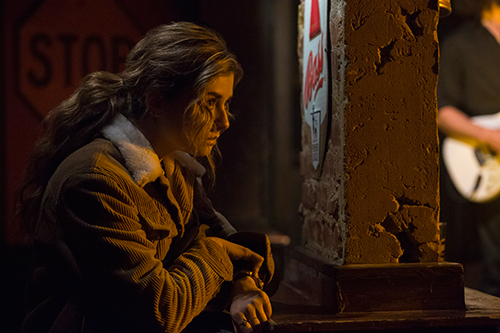
Pilgrim and Shultzes and Heavy Hands, Oh My!
In the most cliche of cliches, Amy’s blackmail is that Senator Shultz kissed another guy during a funeral and those photographs are enough to destroy his chances at being a future president. In a world where p*ssy grabbing and locker room talk hardly hinders a president, it’s a little difficult to accept the idea that the Schultz photos are actually that incriminating.
After all, if Eliza and Anderson Shultz are powerful enough to employ someone like Pilgrim and his seemingly endless army of ultra-powerful, impossible-to-kill assassins, they’re probably powerful enough to utilize the necessary damage control if those photos were to leak. All this is to say that the impetus for Amy to join the story is heavy-handed. And while Amy, and her relationship with Frank, is highly enjoyable, she also brings with her some baggage.
John Pilgrim (Josh Stewart) is an alt-right Christian fundamentalist who is basically the epitome of so many of the flaws in this season. He crams the season full of backstories and fights that either should have been given its own season or been taken out altogether. Any momentum built up by the Schultz and Pilgrim is constantly in direct contest with Billy’s story, and because we’ve already spent a season getting to know Billy Russo, the audience has some more emotional investment in the latter.
So, Pilgrim gets the stereotype and archetype treatment. He’s got a sick wife, he’s being misguided by powerful figures, he’s got a dark past (somehow darker than where he is now), he’s a mindless and ruthless killer with no morals and yet all the morals. We’re left to fill in the blanks of his story on our own. He’s the big bad we don’t really care about. Think of him as the Malekith of this Thor: The Dark World. We prefer the Loki scenes, but we’ve got to slough through Malekith to get to it.
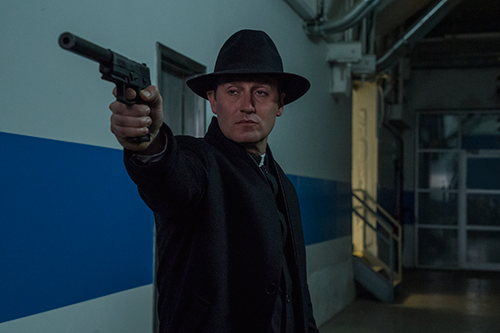
And sure, we love Amy. She reflects a dark mirror to Frank’s past life; she’s a girl nearly the same age as Frank’s late daughter, Lisa, who looks up to Frank for guidance and protection. It’s impossible not to feel the paternal instinct that comes from Frank swooping in, ready to rain down hell on anyone to protect her. But for that
Missing Some Puzzle Pieces
One of the most beautiful elements of season one was when we got to meet Billy Russo (Ben Barnes). All swaggering bravado and big dick energy, Billy was one of the architects of Frank’s downfall. He played a key role in the murdering of Frank’s
In season two, we get one of the more problematic storylines of the season, and characters that really deserved more time then they got. We learn that Billy has traumatic brain injuries, forgetting about how Curtis (Jason R. Moore) lost his leg, forgetting what he did to Dinah Madani (Amber Rose Revah), and definitely forgetting the cause of the schism between him and Frank. To the Billy of season two, he’s still best buds with Curtis and Frank, and Madani is simply some weird woman who keeps staring at him bitterly during his mornings and nights.
He’s been receiving therapy from Dr. Krista Dumont (Floriana Lima) as he is trying to piece together what happened to him. Plagued by nightmares of a white skull and fragments of what occurred in the season finale showdown, Billy’s jigsaw is less his mildly-scarred face — covered by a crafty mask — but rather his deeply shattered psyche.
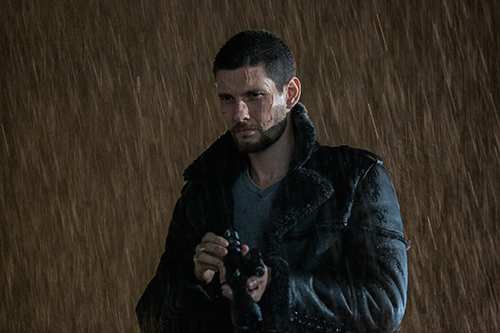
That being said, there are so many aspects of Billy’s personality now that are left unexplored. Fragmented, Billy is torn between rage and anguish as he tries to grasp at the missing parts of his memory, and when he escapes the facilities holding him, he immediately turns to violence.
Gathering what we learn about him in this season, Billy’s actions contradict his backstory. Whether that’s because his current self is an incomplete amalgamation of the Billy we knew from season one and Billy the soldier, or because there wasn’t enough time in the season for explanations, we’ll never know. We learn from Curtis that Billy wasn’t always evil, but rather corrupted by greed and ambition, that he truly did love Frank and his family, hence why the betrayal stung so deeply. But that’s not totally true, is it?
We quickly see Billy, before learning the truth about what happened between him and Frank, quickly slip into the role of a criminal. He gathers his posse of angry vets and they start planning various criminal activities together. This ruthless and
Billy has always had some deep inner rage. We see that being fostered throughout Billy’s life. He is abandoned by his mother, who he later imprisons in a waking nightmare. Then he’s bounced around in the system, eventually meeting Arthur, his child molester foster father, who he also later kills. And then finally he joins the military, where he commits the crimes in Kandahar and eventually betrays the closest thing he has to a true family.
And, yes, the Marines gave Billy a semblance of a brotherhood, and Frank gave him a semblance of a family, but we’re left to fill in the blanks of Billy’s story with the information we’re given. Is he following the same path that he would have even without the same influences of greed? Is this a coping mechanism? Or is it a whole new side of Billy? The fact that we never get to learn about who Billy has become is a damned shame. Because the bits of frailty and confusion that Ben Barnes shows in his season two
We like learning about Billy, especially in the scenes with Frank that are meant to be a comparison of how their relationship has changed. Instead, we’re given a short-lived showdown in the streets and an immediate execution in the finale. I can’t help but wonder how much better off the season would have been if Pilgrim’s story was cut short and Billy’s was given more room to breathe.
Maybe then Billy’s scenes with Krista Dumont would have felt less suffocating. Or maybe we could have cut a little more of Dumont out of the story. We don’t need an explanation of why Krista was suddenly ride-or-die in love with Billy, none of us signed up for a poor man’s Harley Quinn/Joker romance.
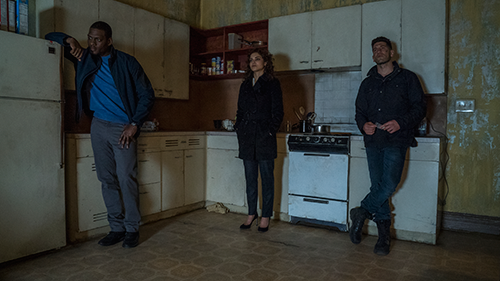
Fighting Not To Be Alone
One strong common thread that linked together all of the characters in the season was a major theme of the season. In the first episode, after Frank’s liaison with Beth, he brings up a quote from the first season of the show. It’s a line from Karen (Deborah Ann Woll) from the episode “Gunner”:
“We are all lonely. I sometimes think that is all that life is. We’re just fighting not to be alone.”
That theme, of loneliness and the desire not to be alone, is a prevailing one. We see it in Frank, seeking comfort with Beth, after a stretch of time on the road alone and trying to find an “after” for himself, now that he’s had his vengeance.
We see it in Madani, staring down at Billy, remembering all the confidences they shared with one another only for it to come to an ugly end. She’s got her own scars, surviving a bullet to the head, and has become increasingly ostracized. By the end of the season, we see that she’s left a position of power within a team, and has become an agent for the CIA instead. It’s significant that we don’t see her working with anyone else in her own office, even among her professional peers, she’s alone in her pursuit of justice.
Curtis, who spends so much of the season cleaning up the mess of Billy’s actions and counseling Frank and Madani, has found someone in his life. He’s no longer alone, but every second spent with these dangerous people not only endanger his life, but also his future with his girlfriend.
And, obviously, Billy’s own loneliness, personified not in his actions, but in his thoughts. Despite Krista’s counseling and therapy, he is unable to piece together his past and no one is there to give him a guiding hand. He’s utterly alone in his nightmares that leave him physically debilitated, and when he learns the truth, he is once again sundered from who he is and who he knows himself to be.
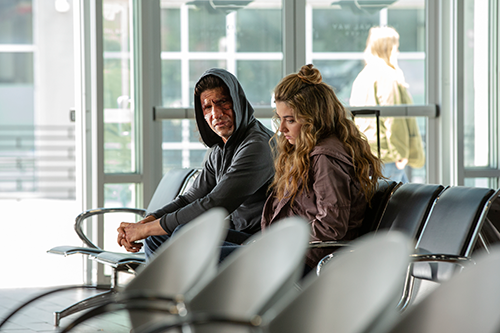
Finally, Amy, who is the loneliest of all. She’s a lonely girl caught in a small bar in the middle of nowhere. Before she meets Frank, there’s no one left that she can trust, no one that she can turn to. Her allies have all been killed, and when she finally meets Frank, despite their initial prickliness, the two of them find companionship with one another that gives both the catharsis needed to move on.
The Marvel Disconnect
There seemed to be a disconnect with this second season of Punisher with the third season of Daredevil. For two series that are already more interconnected than the other shows — sharing characters like Frank, Karen, and Brett Mahoney — it seems slightly odd that there is no mention of characters like Kingpin and Bullseye, given their impact on the city.
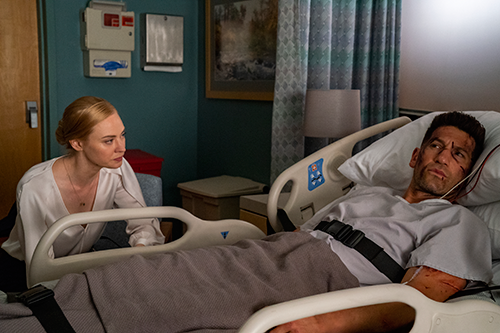
Indeed, when we finally meet Karen again in episode 11, there seems to be a severe lack of connection to Karen’s major upheaval in Daredevil season 3. What happened to Nelson, Murdock, and Page? Is this during the same timeline as
Unfortunately, the season ends in a way that feels painfully unfinished given the uncertainty of the Marvel Netflix universe. With Daredevil, Iron Fist, and Luke Cage all canceled, it’s hard to imagine a spin-off series — even one as well-loved as The Punisher — can survive. It seems like showrunner Steven Lightfoot has left some threads for us to pursue, like Madani’s secret somebody that she needs help with, but we’re only left wondering who that someone is.
And while I have my gripes about season two, I can only hope and pray that somehow we see another season of this show, because this has been the best version of the character to date, and it would be a shame to lose him so soon.